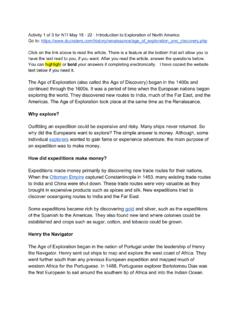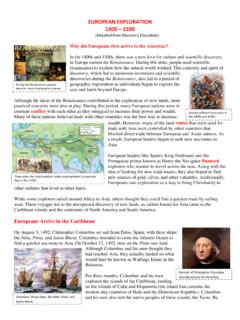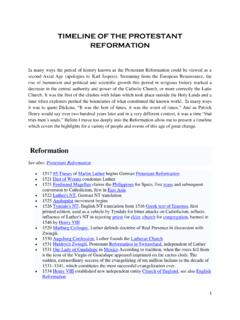Transcription of The Conjugal Dictatorship - Ateneo de Manila University
1 The Conjugal Dictatorship of ferdinand and Imelda Marcos The Conjugal Dictatorship of ferdinand and Imelda Marcos Primitivo Mijares 1976 Edition Primitivo Mijares Page 1. The Conjugal Dictatorship of ferdinand and Imelda Marcos Reprinted by Tatay Jobo Elizes, a self-publisher. This book is reprinted and republished under the expressed permission and/or authorization of the heirs of the late Primitivo Mijares. The copyright to this book belongs to the heirs, and represented by Perla Mijares, the daughter, based in USA. This permission may be withdrawn or rescinded by the said heirs if so desired without objections by Tatay Jobo Elizes. Reprinting of this book is using the present-day method of Print-on-Demand (POD) or Book-on-Demand (BOD) System, where prints will never run out of copies. Primitivo Mijares Testimony in US Congress "After our last footnote updating this paper, Marcos' top confidential press man, Primitivo Mijares, Chairman of the Media Advisory Council and twice President of the National Press Club with Marcos' support, testified in the (House) Subcommittee on International Organizations which held hearings on violations of human rights in South Korea and the Philip- pines.
2 Mr. Marcos attempted to bribe Mijares with $100,000 not to testify but the latter spumed the bribe. Marcos denied the attempted bribery but from a scrutiny of Mijares' testimony, the statement of denial and the cir- cumstances described, the prob ability favors Mijares. Mr. Marcos denied mainly the reported bnliery but not the contents of the testimony of his erstwhile confidential press man. Considering that Mijares was an "insider in the Philippines, Mijares' testimony carries much weight. Diosdado Macapagal Statement "If Mijares were not credible, he would not have merited refutation by Mr. Marcos himself as well us a formal exculpatory inquiry into the Mijares charges by the senior Undersecretary of Foreign Affairs " DIOSDADO P. MACAPAGAL, former President of the Philippines, in his latest book, Democracy in the Philippines. Primitivo Mijares Page 2. The Conjugal Dictatorship of ferdinand and Imelda Marcos To the Filipino People Who dramatized in the Battle of Mactan of April 27, 1521, their rejection of a foreign tyranny sought to be imposed by ferdinand magellan , that they may soon recover lost courage and, with greater vigor and determination, rid the Philippines of the evil rule of a home-grown tyrant with the same initials.
3 Primitivo Mijares Page 3. The Conjugal Dictatorship of ferdinand and Imelda Marcos About the Author by Cris D. Cabasares, written in 1976. PRIMITIVO "TIBO" MIJARES Is a 44-year-old newspaperman's news- paperman, the highlights of whose life may even be more colorful than the man he writes about In this book. For, really, what will ferdinand E. Marcos be, If you take away his self-serving and self-created World War II exploits? Mijares went through that world conflagration experiencing as a young boy a tragedy and horror that would have driven hardened and matured men stark- raving mad. He was but 12 years old when he came upon the mutilated bodies of his slain mother, dead from the bayonet thrusts of Japanese soldiers, and his father, dying from both Japanese bayonet and bullet wounds, in the smoking ruins of their home. Mijares was to narrowly escape death from the massacre and burning by retreating Japanese soldiers of his hometown of Santo Tomas, Batangas, in the Philippines, only because a few hours earlier he had led as the eldest child his other younger sisters and brother out into the country to clear a field for planting.
4 While his gunsmith father, Jose, was busy turning out home-made pistols, called locally as paltiks for the resistance movement, young Mijares served as the driver or cochero for the family's horse-drawn rig, carretela, used in the delivery of vinegar to outlying towns. In between supplying guns to the guerrillas, the Mijares family was engaged in the fermentation of that liquid so necessary to the Filipino palate. When the Japanese military one day decided to commandeer all the horses In the town, Mijares persuaded the Japanese to allow him to drive his carretela home to unload the empty vinegar jars before surrendering his horse. But along the way Mijares pretended to be yelling orders at his horse, although actually he was shouting, in the local dialect unknown to the Japanese soldiers riding beside him, to his townmates to hide their horses. After World War II, the four Mijares orphans were distributed among their mother's uncles with the girls joining an uncle in Borneo, now Sabah, and the boys staying in the Philippines.
5 Tibo went to school near Baguio where his uncle, an agriculturist, was stationed. He edited the high school newspaper, was elected president of his graduating class and finished as valedictorian. Mijares became the youngest editor of the Baguio Midland Courier, the biggest city newspaper, in 1950. He became a full-pledge reporter the same day he joined the defunct Manila Chronicle on August 15, 1951, covering all the major beats. Nights Mijares pursued his college studies, finishing his Bachelor of Arts degree in 1956, and Bachelor of Laws in 1960, at the Lyceum of the Philippines. He passed the Philippine bar examinations also in 1960. Tibo figured in the most tumultuous events of his country. He was with Arsenio H. Lacson, the best and most colorful mayor Manila ever had, when Lacson, under the machineguns of armed forces armored cars, practically cursed into retreat back to camp the first attempt to impose martial law in the city. Primitivo Mijares Page 4. The Conjugal Dictatorship of ferdinand and Imelda Marcos Tibo was both a star witness and active participant in the greatest single upheaval to hit the Philippines.
6 The full story is, of course, in this book. --oo-- Original Cover of the 1976 Edition Primitivo Mijares Page 5. The Conjugal Dictatorship of ferdinand and Imelda Marcos Contents Author's Foreword - 7. Acknowledgment - 9. Chapter I - A Summer Night in Washington, - 10. Chapter II - ' Manila -Gate' - 34. Chapter III - Twilight of Democracy - 48. Chapter IV - A Dark Age Begins - 83. Chapter V - Infrastructure of Martial Law - 111. Chapter VI - The Other Villains - 143. Chapter VII - The Reign of Greed - 157. Chapter VIII - The Unholy Trinity - 176. Chapter IX - Too Late the Hero - 194. Chapter X - The Loves of Marcos - 218. Chapter XI - Philippine Gulag': A Paralysis of Fear - 227. Chapter XII - The Era of Thought Control - 266. Chapter XIII - American Tax Dollar Abets Repression - 301. Chapter XIV - International Protection Racket - 329. Chapter XV - Spineless Judiciary Legits a Pretender - 339. Chapter XVI - Plans in Perpetuity - 365. Chapter XVII - Whither Marcos? - 389.
7 Photo Section - 411. Author's Picture Primitivo Mijares Page 6. The Conjugal Dictatorship of ferdinand and Imelda Marcos Author's Foreword This book is unfinished. The Filipino people shall finish it for me. I wrote this volume very, very slowly. 1 could have done with it In three months after my defection from the Conjugal Dictatorship of ferdinand and Imelda Marcos on February Instead, I found myself availing of every excuse to slow it down. A close associate, Marcelino P. Sarmiento, even warned me, Baka mapanis 'yan." (Your book could become stale.). While I availed of almost any excuse not to finish the manuscript of this volume, I felt the tangible voices of a muted people back home in the Philippines beckoning to me from across the vast Pacific Ocean. In whichever way I turned, I was confronted by the distraught images of the Filipino multitudes crying out to me to finish this work, lest the frailty of human memory -- or any incident a la Nalundasan consign to oblivion the matters I had in mind to form the vital parts of this book.
8 It was as if the Filipino multitudes and history itself were surging in an endless wave presenting a compelling demand on me to San Francisco, California perpetuate the personal knowledge I have gained on the infamous machinations of ferdinand E. Marcos and his overly ambitious wife, Imelda, that led to a day of infamy in my country, that Black Friday on September 22, 1972, when martial law was declared as a means to establish history's first Conjugal Dictatorship . The sense of urgency in finishing this work was also goaded by the thought that Marcos does not have eternal life and that the Filipino people are of unimaginable forgiving posture. I thought that, if I did not perpetuate this work for posterity, Marcos might unduly benefit from a Laurelian statement that, when a man dies, the virtues of his past are magnified and his faults are reduced to molehills. This is a book for which so much has been offered and done by Marcos and his minions so that it would never see the light of print.
9 Now that it is off the press. I entertain greater fear that so much more will be done to prevent its circulation, not only in the Philippines but also in the United States. But this work now belongs to history. Let it speak for itself in the context of developments within the coming months or years. Although it finds great relevance in the present life of the present life of the Filipinos and of Americans interested in the study of subversion of democratic governments by apparently legal means, this work seeks to find its proper niche in history which must inevitably render its judgment on the seizure of government power from the people by a lame duck Philippine President. If I had finished this work immediately after my defection from the totalitarian regime of ferdinand and Imelda, or after the vicious campaign of the Dictatorship to vilify me in July-August. 1975, then I could have done so only in anger. Anger did influence my production of certain portions of the manu- script.
10 However, as I put the finishing touches to my work, I found myself expurgating it of the personal venom, the virulence and intemperate language of my original draft. Some of the materials that went into this work had been of public knowledge in the Philippines. If I had used them, it was with the intention of Primitivo Mijares Page 7. The Conjugal Dictatorship of ferdinand and Imelda Marcos utilizing them as links to heretofore unrevealed facets of the various ruses that Marcos employed to establish his Dictatorship . Now, I have kept faith with the Filipino people. I have kept my rendezvous with history. I have, with this work, discharged my obligation to myself, my profession of journalism, my family and my country. I had one other compelling reason for coming out with this work at the great risks of being uprooted from my beloved country, of forced separation from my wife and children and losing their affection, and of losing everything I have in my name in the Philippines or losing life itself.





